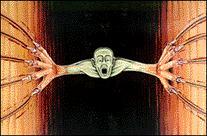Posted on April 14, 2025
Hollow Humanity
Beware "bodyoids"
and other warning signs
by
Daniel Clark
Just when
it might have seemed like the Culture of Death had run out of dehumanizing
euphemisms, bioscientists Carsten Charlesworth, Henry
Greeley and Hiromitsu Nakauchi have come up with a new one. In a March article in the MIT Technology
Review, they propose the invention of "bodyoids."
The suffix "oid"
means "resembling," so a "bodyoid" would be something
that resembles a body. That's not quite
accurate, however, because the creatures they describe do not merely resemble
bodies; they are bodies.
Furthermore, they are human bodies. In fact, they are the bodies of human beings
who are still alive, which might heretofore have been described as "people."
 The hypothetical production of what
they call "ethically sourced human bodies" is anything but. It begins with the cloning of a human
embryo. This clone would be genetically
manipulated to retard the growth of its brain, so that although it would
develop an intact human body, it would never be conscious or feel pain. The next step would depend on the successful
invention of an artificial womb, in which the embryo would be implanted. From that stage, the bodyoid
would be kept alive until there arose a need to harvest its tissues and organs.
The hypothetical production of what
they call "ethically sourced human bodies" is anything but. It begins with the cloning of a human
embryo. This clone would be genetically
manipulated to retard the growth of its brain, so that although it would
develop an intact human body, it would never be conscious or feel pain. The next step would depend on the successful
invention of an artificial womb, in which the embryo would be implanted. From that stage, the bodyoid
would be kept alive until there arose a need to harvest its tissues and organs.
The
authors concede that these technological advances remain a long way off, but
they say it is important to begin the discussion now, in order to resolve any
ethical disputes so that societies may be prepared to act when the time comes. Is there any wonder why they might think this
is an opportune time to promote such a cause?
In 2017,
an Australian company called Baby Bee Hummingbirds began offering a service by
which it would take people's "extra" embryos from in-vitro fertilization, kill
and cremate them, and use the ashes to create keepsake jewelry. Evidently, the idea has caught on, because
there are now multiple copycats in that same business. One of those, Blossom Keepsakes, explains in
a sales pitch on its website why somebody might want to do such a ghastly
thing. "By choosing to create a keepsake
from your unused IVF embryos, you are not only preserving a precious moment in
time but also honouring the resilience and strength
it took to embark on the path of IVF. It
is a way to celebrate the love, hope, and determination that brought you to
this point." This shallow sentimentalism
fails to disguise the utter callousness of it.
One's own, deliberately killed embryonic offspring have become trophies
that one awards to oneself.
Like the
hypothetical bodyoids, "extra" IVF embryos lack
consciousness or the capacity to feel pain, but they are indisputably living
human beings. The killing of frozen
embryos is justified by the rationalization that they are "going to be destroyed
anyway," but they do not have an expiration date. Embryos have been successfully implanted and
born after having been frozen for as long as thirty years. The only thing that renders them "going to be
destroyed anyway" is that somebody has made the decision to destroy them. If such a decision is justifiable on the basis
of celebrating one's own love, hope and determination, then harvesting bodyoids in an attempt to save other people's lives would
seem comparatively uncontroversial.
 If we begin creating bodyoids, there inevitably will be "extra" ones of those,
too. What will become of them? Will they be used in the manufacture of
industrial products? Biofuels? Food?
Well, why not? Anything short of
that would be an admission that these human lives that we're whimsically
creating and killing are something more than just stuff.
If we begin creating bodyoids, there inevitably will be "extra" ones of those,
too. What will become of them? Will they be used in the manufacture of
industrial products? Biofuels? Food?
Well, why not? Anything short of
that would be an admission that these human lives that we're whimsically
creating and killing are something more than just stuff.
Neocutis is a San Francisco-based cosmetics
producer that uses an ingredient called "processed skin cell proteins" in its
anti-aging products. These are proteins
that were derived from a fetal stem cell line that itself originated from a
human fetus that was killed in an abortion.
They were not themselves a part of that fetus, but instead were taken
from tissue that was replicated from its stem cells. Nevertheless, that degree of separation does
not alter the conclusion, which once would have been obvious to nearly
everybody, that the use of a deliberately killed person for such a purpose is
grossly unethical.
But what
if people really were literally cannibalizing human beings to achieve the same
result? In 2012, South Korean customs
officials confiscated a shipment of "miracle cure" pills from China, which had
been filled with the powdered flesh of aborted and stillborn babies. What if Americans could order these online
and have them delivered? Would it be
acceptable to take them? Suppose we
could make a similar product by using the same embryo ashes that are now being
worn as jewelry. If we could inject the
remnants of these tiny human individuals into capsules, and swallow them to
slow the aging process, would that be so wrong?
The embryos were going to be destroyed anyway. Why let them go to waste, when those of us
who remain living could have healthier hair and smoother skin?
Once the
premise has been established that certain people exist solely for the purpose
of being used by others, it doesn't really matter to what uses they are put. Not only will it be denied that they have any
rights, but because they lack self-awareness, they cannot even be objects of
empathy. Thus, we will be able to do
anything with them that we can stomach, which is getting to be more and more
all the time.
The Shinbone: The
Frontier of the Free Press